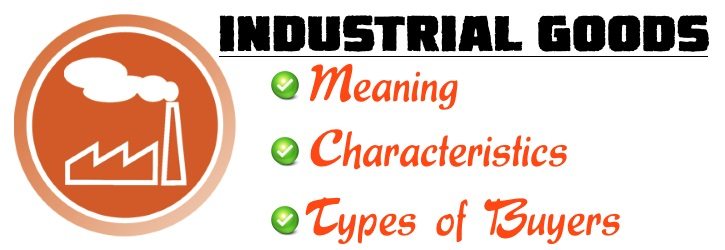Industrial Goods | Meaning | Characteristics | Types of Buyers
Table of Contents
- 1 What are Industrial Goods?
- 2 Characteristics of Industrial Goods
- 2.1 1. Heavy investment in Industrial goods
- 2.2 2. Complex nature of products
- 2.3 3. Derived demand for Industrial goods
- 2.4 4. Limited number of Buyers
- 2.5 5. Inelastic demand
- 2.6 6. Buying is always a group process
- 2.7 7. Higher purchase value of Industrial goods
- 2.8 8. After-sale service of Industrial goods
- 2.9 9. Seller’s reputation
- 2.10 10. Leasing
- 2.11 11. Rational and not emotional buying
- 2.12 12. Greater awareness of the buyers
- 2.13 13. Shorter channel of distribution
- 3 Different types of buyers of Industrial Goods
What are Industrial Goods?
The goods purchased for industrial or business use are known as industrial goods. The industrial goods will fall under the following categories:

- Installations — Example: Machinery
- Accessories — Example: Power Generator
- Raw materials — Example: Cotton, timber, etc.
- Manufactured parts — Example: Radiator, battery, etc., needed by a car manufacturer.
- Supplies or Consumables — Example: Lubricants, oils, etc.
Characteristics of Industrial Goods
1. Heavy investment in Industrial goods
The production of industrial goods calls for heavy capital investment. Most of the companies involved in the production of industrial goods raise capital by issuing shares and debentures and also by resorting to borrowing from financial institutions.
2. Complex nature of products
Industrial goods always appear to be complex in view of their technical nature. It is not possible for a layman to assess the value of such goods. One has to have technical knowledge to be able to assess them.
3. Derived demand for Industrial goods
The demand for industrial goods is a derived demand. i.e., it is influenced by the demand for the goods they help to manufacture. For example. the demand for a soft drink making plant will be determined by the demand for soft drink.
4. Limited number of Buyers
When compared to consumer and agricultural goods, the number of buyers of industrial goods is limited. Such buyers are also found in certain regions.
For example, most of the buyers of machines needed for making cotton cloth are found in and around Coimbatore in Tamilnadu.
5. Inelastic demand
The demand for industrial goods is relatively inelastic, i.e., it is not affected by changes in price.
6. Buying is always a group process
Purchase of consumer or agricultural goods can be undertaken by an individual. But in the case of industrial goods, a group or a team is generally involved in the purchase. The team may consist of engineers, financial experts and others.
7. Higher purchase value of Industrial goods
As industrial goods are very highly priced, each purchase involves a very high amount. This is in contrast to consumer and agricultural goods where the amount involved in each purchase is much less.
8. After-sale service of Industrial goods
This is something which is always important in the marketing of industrial goods. The seller must ensure regular repair and maintenance service to the buyer.
9. Seller’s reputation
The seller’s reputation is generally not important in the market for agricultural goods. It is important to a certain extent in the market for consumer goods, particularly in the case of durable goods. The reputation of the seller is vital in the case of industrial goods. The buyers would always prefer to buy from reputed suppliers rather than from an unknown source.
10. Leasing
Another peculiar feature of industrial goods marketing is that the seller may enter into a leasing agreement with the user instead of making an outright sale of the machinery. This does not apply to consumer goods.
11. Rational and not emotional buying
In the case of consumer goods, the buying decision is influenced by status, prestige and such other emotional factors. The buyer of industrial goods, on the other hand, makes an objective analysis of the utility of the product before taking the purchase decision.
12. Greater awareness of the buyers
The buyers of consumer goods may not hive absolute knowledge of the goods they buy. They adopt a casual approach to buying. On the other hand, the buyers of industrial goods have thorough knowledge of the product, its source of supply, the alternative models available, the price of the competing models, etc.
13. Shorter channel of distribution
The marketers of industrial goods usually supply the goods directly to their customers. Wholesalers, retailers and others who work actively in the consumer and agricultural goods markets are generally absent in the market for industrial goods.
The marketers of industrial goods resort to direct supply mainly because the number of buyers is less and such buyers are also found in certain regions only.
Different types of buyers of Industrial Goods
The buyers of industrial goods usually fall under the following three categories:
1. Those who buy components
A car manufacturer may, for example, buy radiators, batteries, etc., from the manufacturers of these components.
2. Those who buy and install machines
The same car manufacturer may install a machinery to check the wheel alignment. Here, the machine is purchased for service purposes.
3. Those who buy for resale
They are the distributors of industrial goods. For example, there are distributors for car radiators, car batteries and so on.

